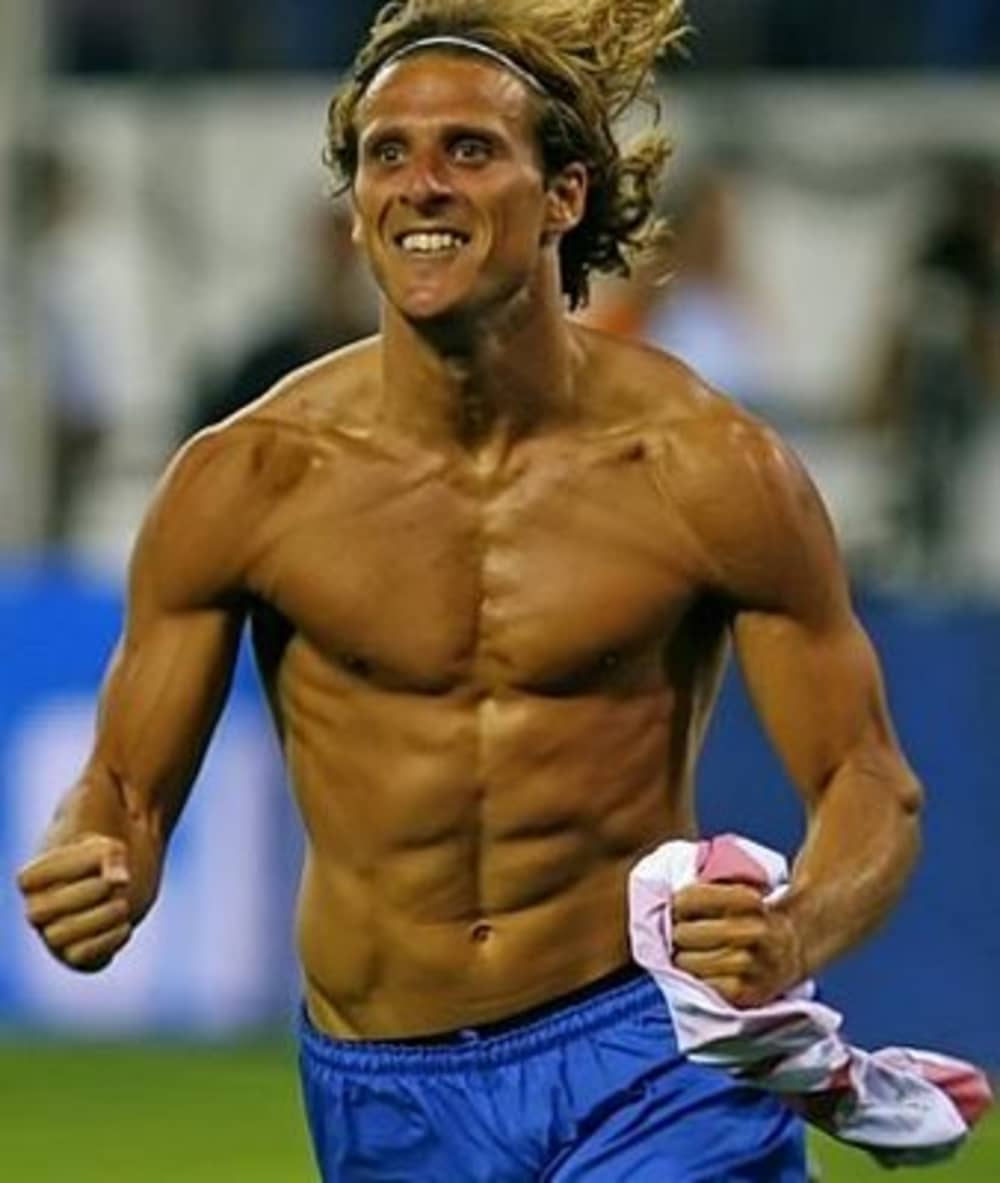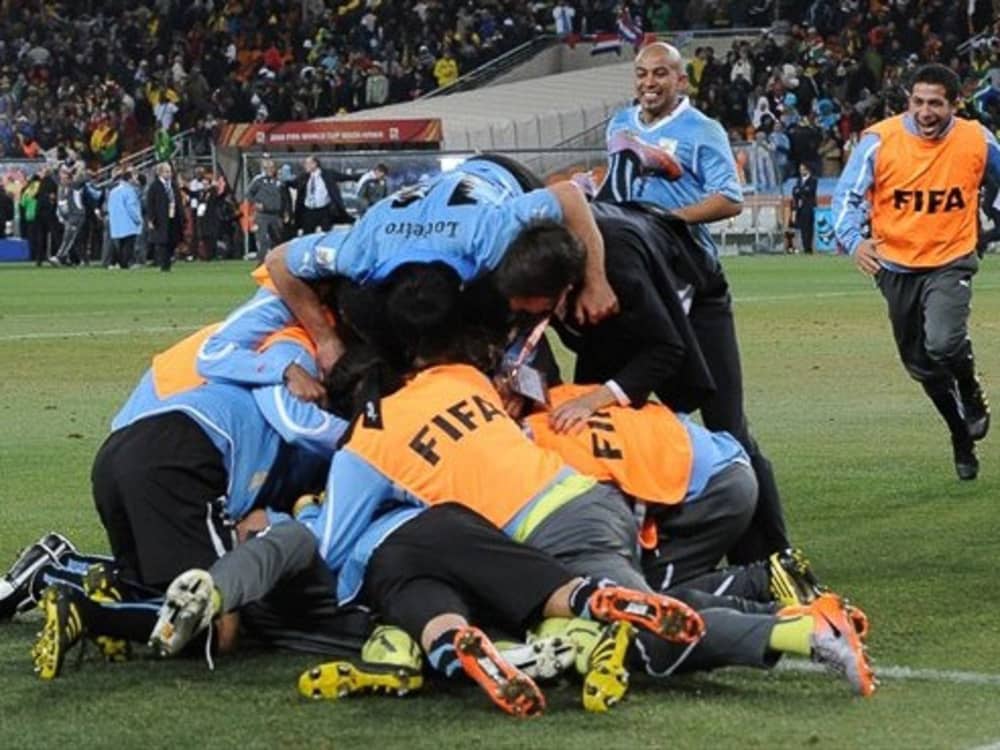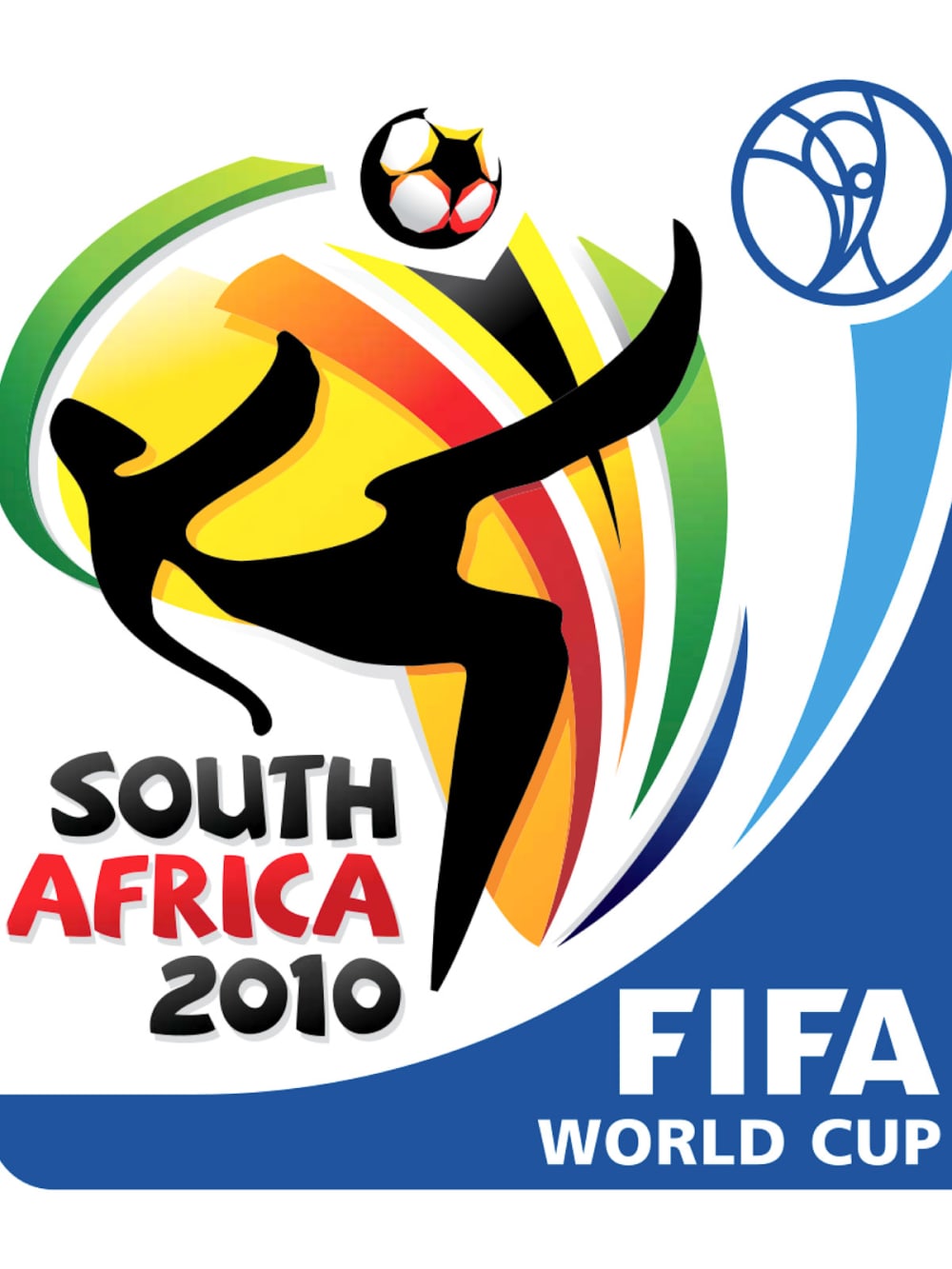Summin' Up the Cup
Bitter with the sweet: Revelations of an unforgettable World Cup
 Francesc Fabregas and Xavi Hernandez of Spain celebrate the first — and only —goal during the 2010 FIFA World Cup final match between Netherlands and Spain.(Photo by Jamie McDonald/Getty Images for Sony
Francesc Fabregas and Xavi Hernandez of Spain celebrate the first — and only —goal during the 2010 FIFA World Cup final match between Netherlands and Spain.(Photo by Jamie McDonald/Getty Images for Sony Uruguay's Diego Forlan was the tournament's most valuable player.
Uruguay's Diego Forlan was the tournament's most valuable player. Nelson Mandela's appearance at the final match drew a rapturous response. Hecanceled an appearance at the opening game after his granddaughter was killed inan automobile accident.
Nelson Mandela's appearance at the final match drew a rapturous response. Hecanceled an appearance at the opening game after his granddaughter was killed inan automobile accident. Uruguay celebrates a controversial win over Ghana.
Uruguay celebrates a controversial win over Ghana. South Africa drew high marks for a well-run, spirited World Cup.
South Africa drew high marks for a well-run, spirited World Cup.
One month and 64 matches later, the South African vuvuzelas that gave us the signature bee-swarm blare of the 19th FIFA World Cup have fallen silent. The stadia are empty, the crowds gone. But long after the face paint that emblazoned hues of 32 nations’ flags on cheeks old and young has been scrubbed off, after the matching wigs have been discarded and the patriotic costumes packed, this aficionado of the world’s most popular sporting event is left with a bittersweet aftertaste.
Sweet: It was gratifying that the bookend matches were played in Soweto to a home crowd as passionate about its national team as it was colorblind. Nelson Mandela graced both occasions, the first in spirit only, the last in person.
Sweet: The exuberance of the hosts. South Africa’s team sang and danced their way to all of their matches, exhibiting a refreshing immunity to the nerves afflicting most other squads from the get-go. There was unbridled joy when Siphiwe Tshabalala opened the scoring with an exquisitely struck volley, the first World Cup goal on African soil of a quality befitting the occasion.
Sweet: The personal triumph of Uruguayan talisman Diego Forlan, winner of the Golden Ball award for the tournament’s best player. Forlan’s inspiration is his sister Alejandra, left paralyzed at the age of 17 by a car accident. As she lay in a hospital bed, the 12-year-old Diego promised her he would succeed as a soccer player so he could get her the best doctors in the world.
Sweet: Plucky New Zealand. Minnows in the world of international soccer, they outperformed defending champions Italy and went home unbeaten.
Sweet: The way all of Africa pulled together behind Ghana, the continent’s sole representative in the quarterfinals. Seeking to become the first African country to reach a World Cup semifinal, Ghana deployed its youthful vigor against Uruguay, leading to one of the most dramatic climaxes to any World Cup quarterfinal ever, to be remembered for …
Bitter: Uruguay striker Luis Suarez’s instinctive goal-line handball to prevent a certain match-winning Ghanaian goal in the last minute of extra time raises an interesting question: Can an instinctive reaction also be deemed an intentional one? If so, the subsequent vilification of Suarez by the African fans and press is justified. If not, his red card and the awarding of a penalty to Ghana was a misapplication of the rules, because a handball is only punishable if it is intentional.
Regardless, the outcome of the match demonstrated that for some infractions, the rules more effectively punish the offender than compensate the victim. No such provision exists in the laws of the game, but under the circumstances, awarding a penalty goal to Ghana would not have been a miscarriage of justice.
Bitter: The integrity of the game is diminished when fairness is compromised. The laws of the game are not set by international governing body FIFA (French acronym for the International Federation of Association Football), but IFAB, the International Football Association Board, comprised of eight members, one representing each of the United Kingdom’s four pioneering football associations and four representatives from FIFA.
Rules changes require approval by at least six votes, so while FIFA approval is necessary, FIFA alone cannot change the laws of the game.
The octet has its work cut out for it at its next meeting. Several high-profile incidents cast a spotlight on either the rules themselves or the way they are (and sometimes aren’t) enforced. Much acrimony was directed at the referees, but the blame lies on the lapels of the suits around the IFAB board table.
The referees are human and, like the rest of us, can make an incorrect call when watching fast-paced action in real time, particularly as it relates to whether the entirety of the ball has crossed the goal line and whether or not a strike should be disallowed for an infringement. The USA, England and Mexico all suffered infuriating injustices. Technology, in the form of instant replay, can address this deficiency. The IFAB can learn from the NFL.
Bitter: The fake histrionics of some players when they are fouled.
Bitter: The bone-crunching over-aggression that some players — some teams — used as the foundation of their game. In the final, the sport’s quadrennial showpiece, Dutch midfielder Nigel De Jong executed a studs-up stomp on the sternum of his Spanish counterpart Xavi Alonso. Referee Howard Webb should have sent De Jong off, but didn’t want to deprive the global audience of an 11-a-side contest so early in the match, a classic damned-if-you-do-damned-if-you-don’t decision.
Bittersweet: FIFA’s "Say No to Racism" campaign is well-meaning but meaningless unless the federation puts its teeth where its mouth is and rescinds the membership of countries who practice legal or institutional discrimination.
Sweetest of all: The best team won. Spain became the first nation to win the championship after losing its first match by sticking to their mellifluous passing game.
The party may be over, but Spaniards will dance on. Four years hence, the eyes of the world will turn to Rio and the anticipated resurgence of Brazil’s Samba Soccer. Until then, in the hope that FIFA acts appropriately, here’s tipping a Stetson to the rightful reign of Spain’s Flamenco Football.
Tarif Abboushi is a professional engineer whose religion is soccer.
